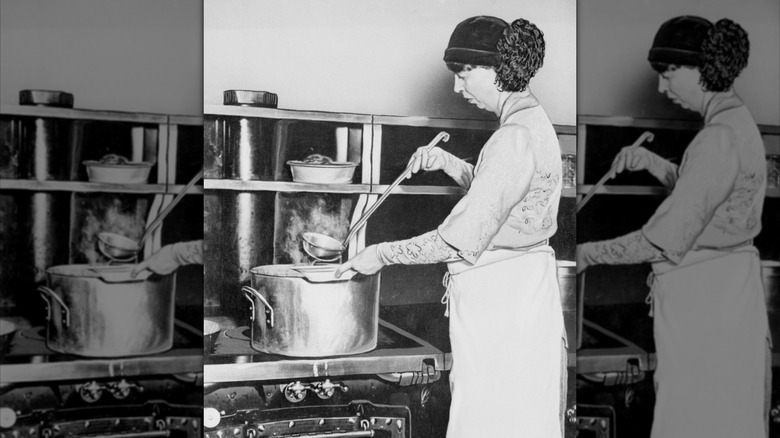Eleanor Roosevelt Made Herself The Same Supper In The White House Kitchen Every Sunday
It has long been said that while some people live to eat, others simply eat to live. Eleanor Roosevelt was more of the latter. As the wife of Franklin D. Roosevelt, the 32nd president of the United States, she certainly made an impact on politics and culture during her long tenure as a first lady, but she's also the reason why the worst food in White House history belonged to FDR. Between her odd palate and the hard economic situation of the Great Depression (and later World War II), meals born during Eleanor's "reign" were known to be abysmal. There was, however, one exception to this rule: Her scrambled eggs.
Every Sunday, Eleanor Roosevelt made scrambled eggs for supper. Except, she didn't make them in the kitchen like a regular housewife might. Mrs. Roosevelt and her husband hosted company, so the eggs were made directly in front of seated guests. The ingredients reportedly consisted of just eggs and cream and were brought to the table by the staff. Rather than a pan, Eleanor used a chafing dish to cook the eggs, allowing her to make the meal outside the kitchen. The scrambled eggs were then served alongside meat, salad, and dessert (her favorite was the so-called hasty pudding, a Depression Era classic), all of which were made by the kitchen staff. The tradition of Sunday's scrambled eggs apparently started well before the Roosevelt couple moved into the White House and continued on for many decades.
Eleanor Roosevelt saw cooking as a science
Because of the rough economic climate during which Eleanor Roosevelt became the First Lady, she took it upon herself to ensure the meals served at the White House were not lavish, expensive, or completely out of touch with what the general public had available. She saw cooking as a form of science — something that could be studied and perfected, ultimately serving the purpose of providing the most optimum nutrition at the lowest cost possible. Together with Cornell University, she created meals that cost as little as seven and a half cents per person. They weren't tasty, but they provided the necessary nutrition, which was Eleanor's main goal. Operating within economic restrictions did mean the menus got quite repetitive, and so there was a time when Franklin D. Roosevelt was forced to eat sweetbreads six days a week.
Eleanor Roosevelt's approach to cooking and creating daily meals became a strong political statement. At a time when women were mostly homemakers, she elevated their role from passive to active by directly addressing them as key economic players — reminding them of the power they hold within a family system. That said, she did relax a bit after her time in the White House was over and didn't stick to the modest cuisine forever.

